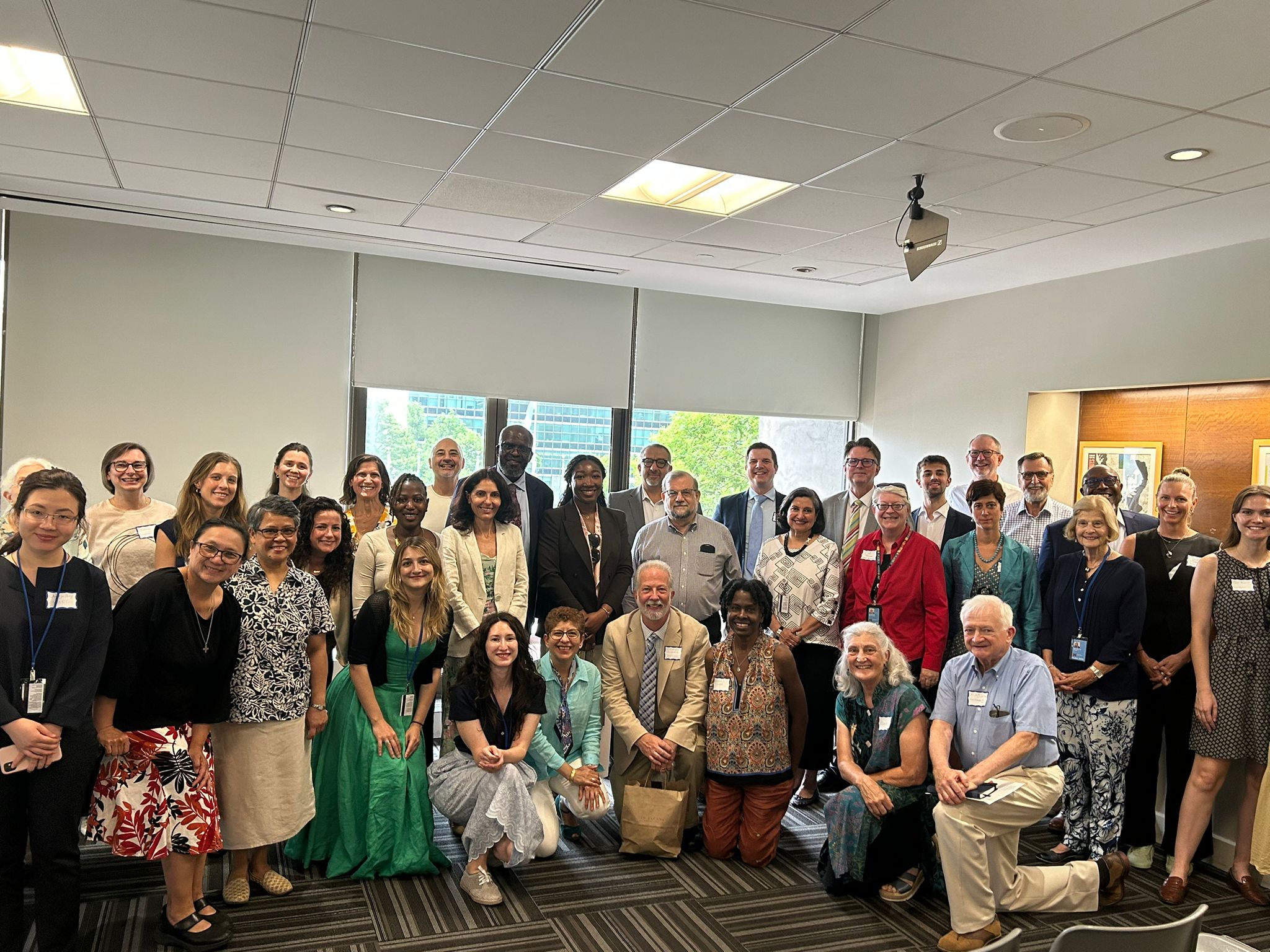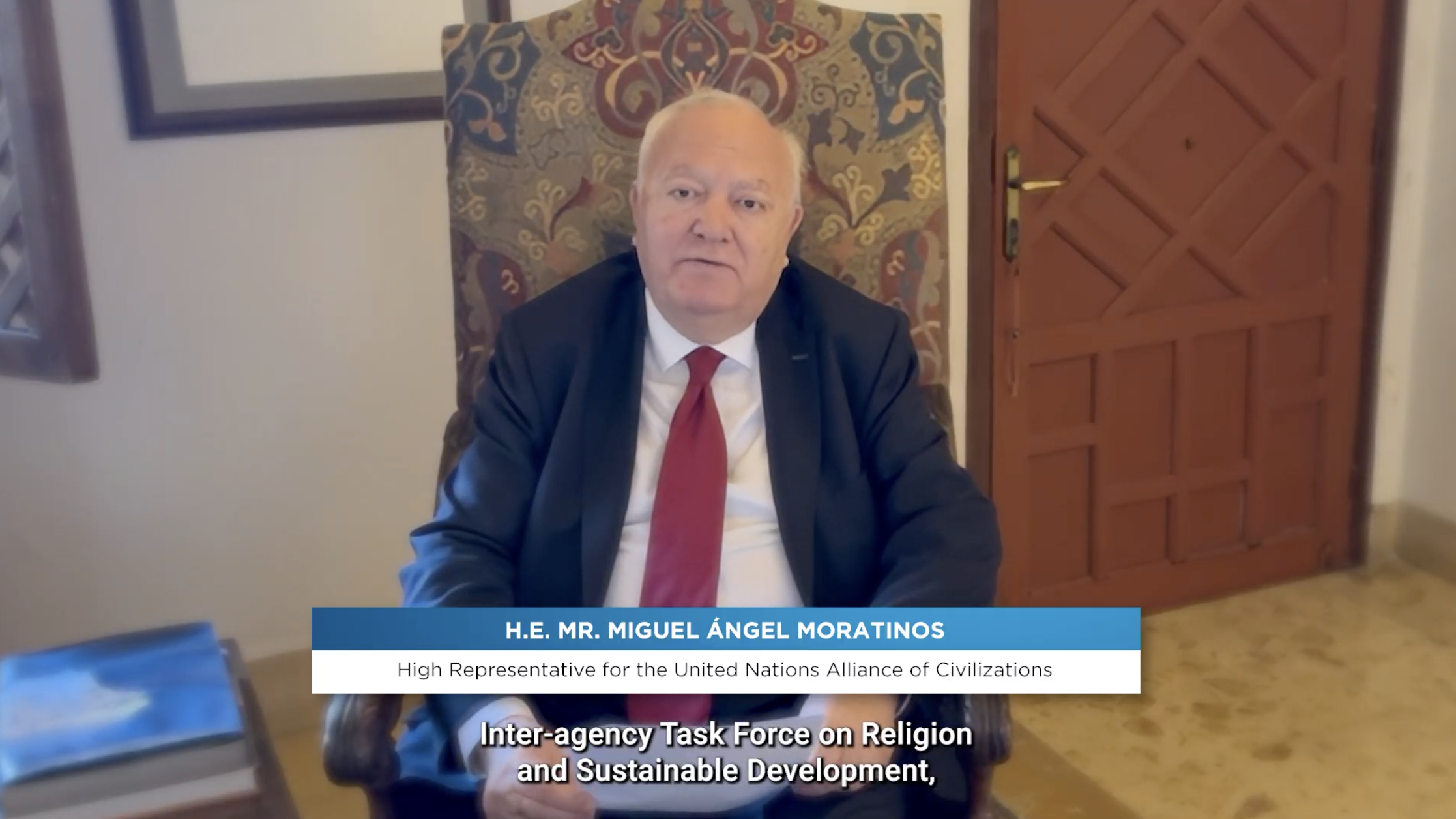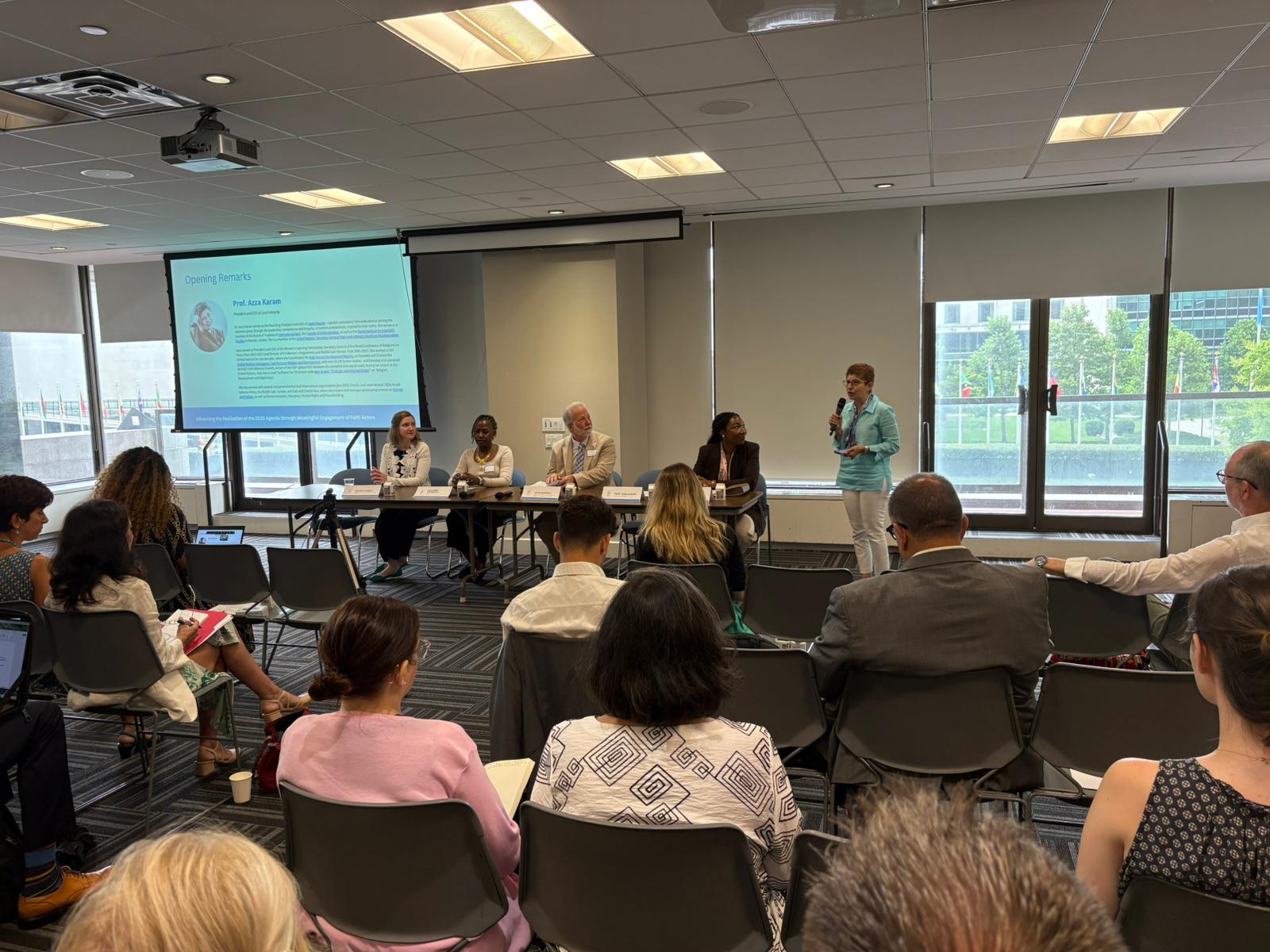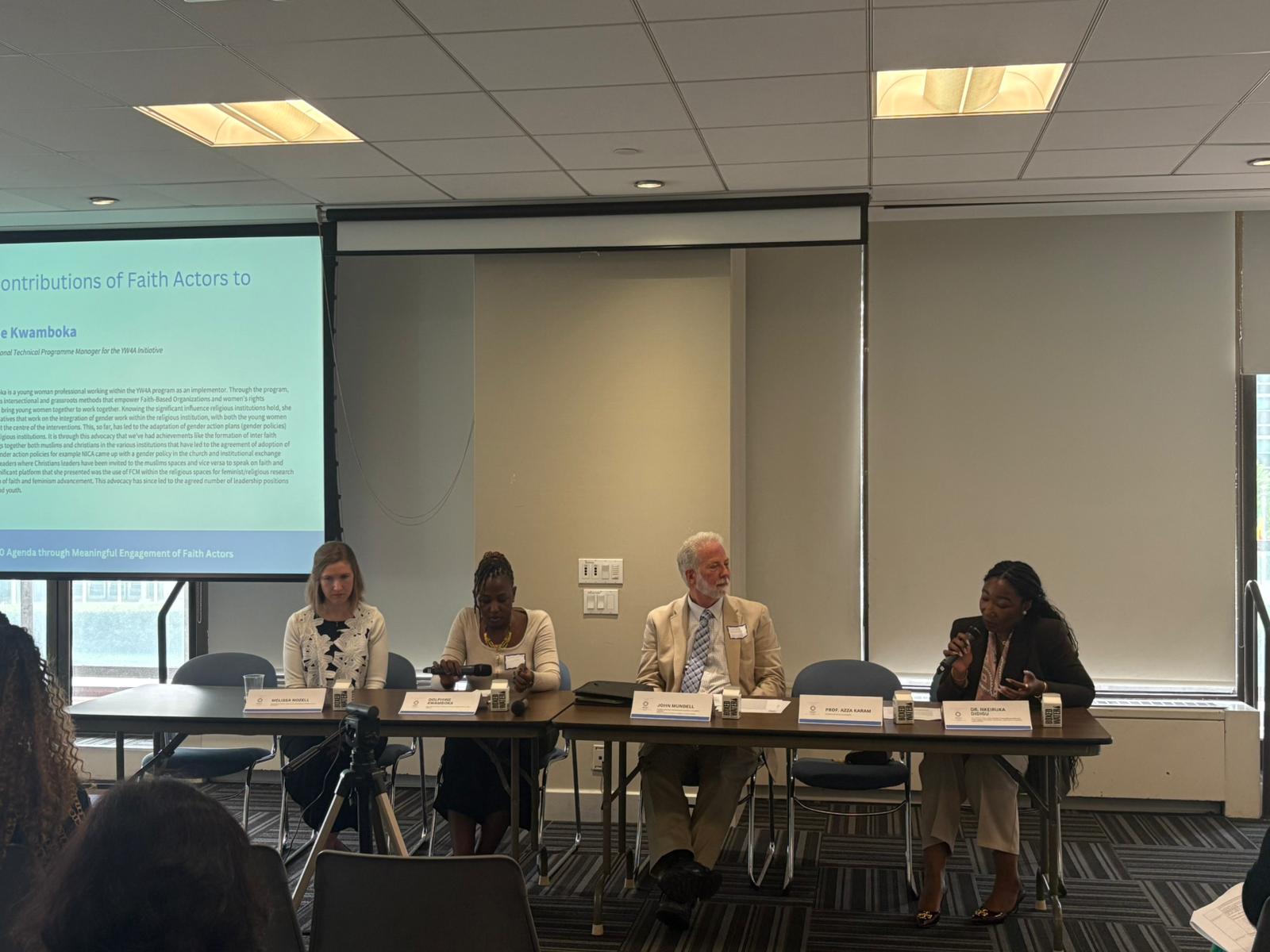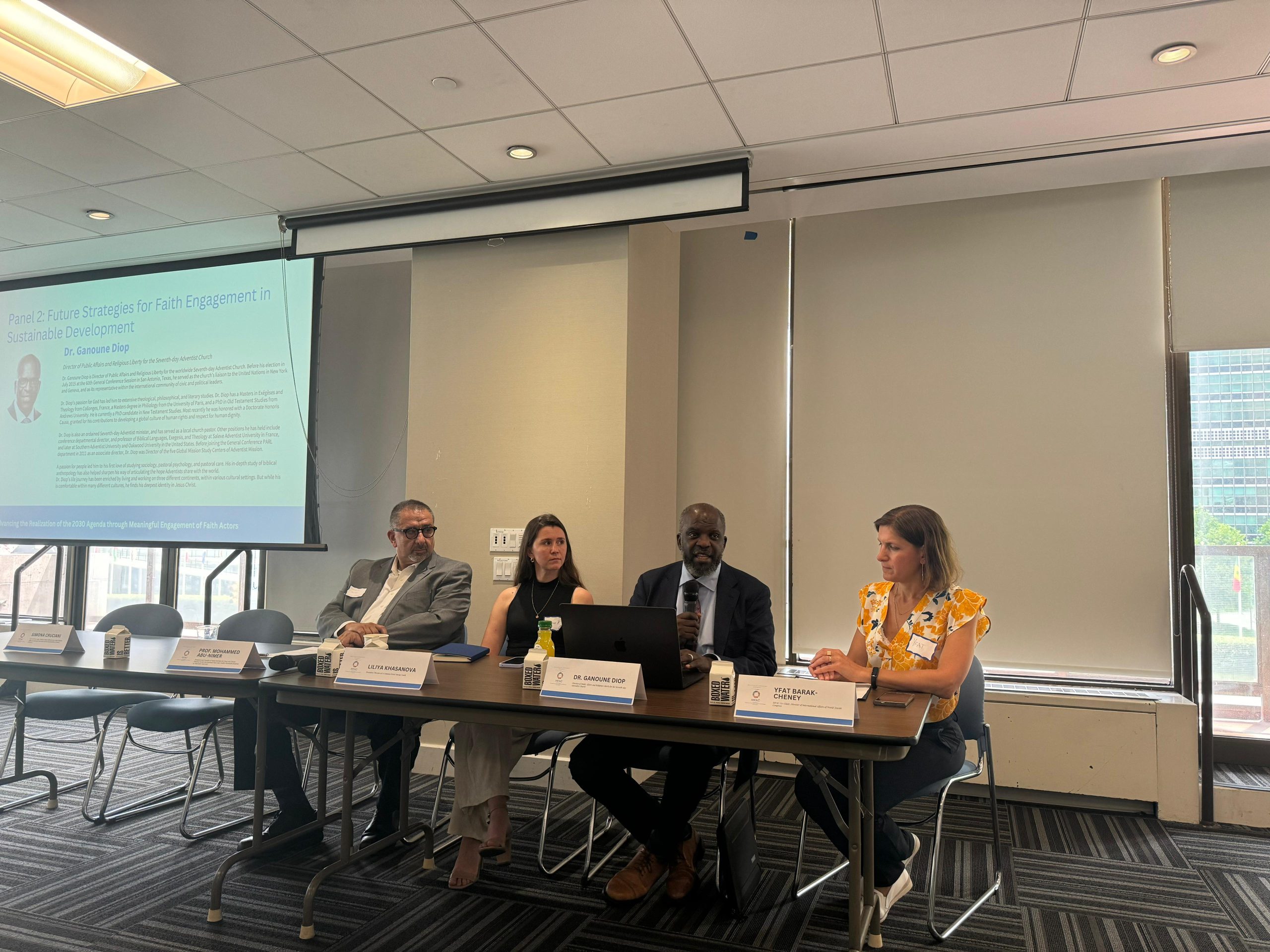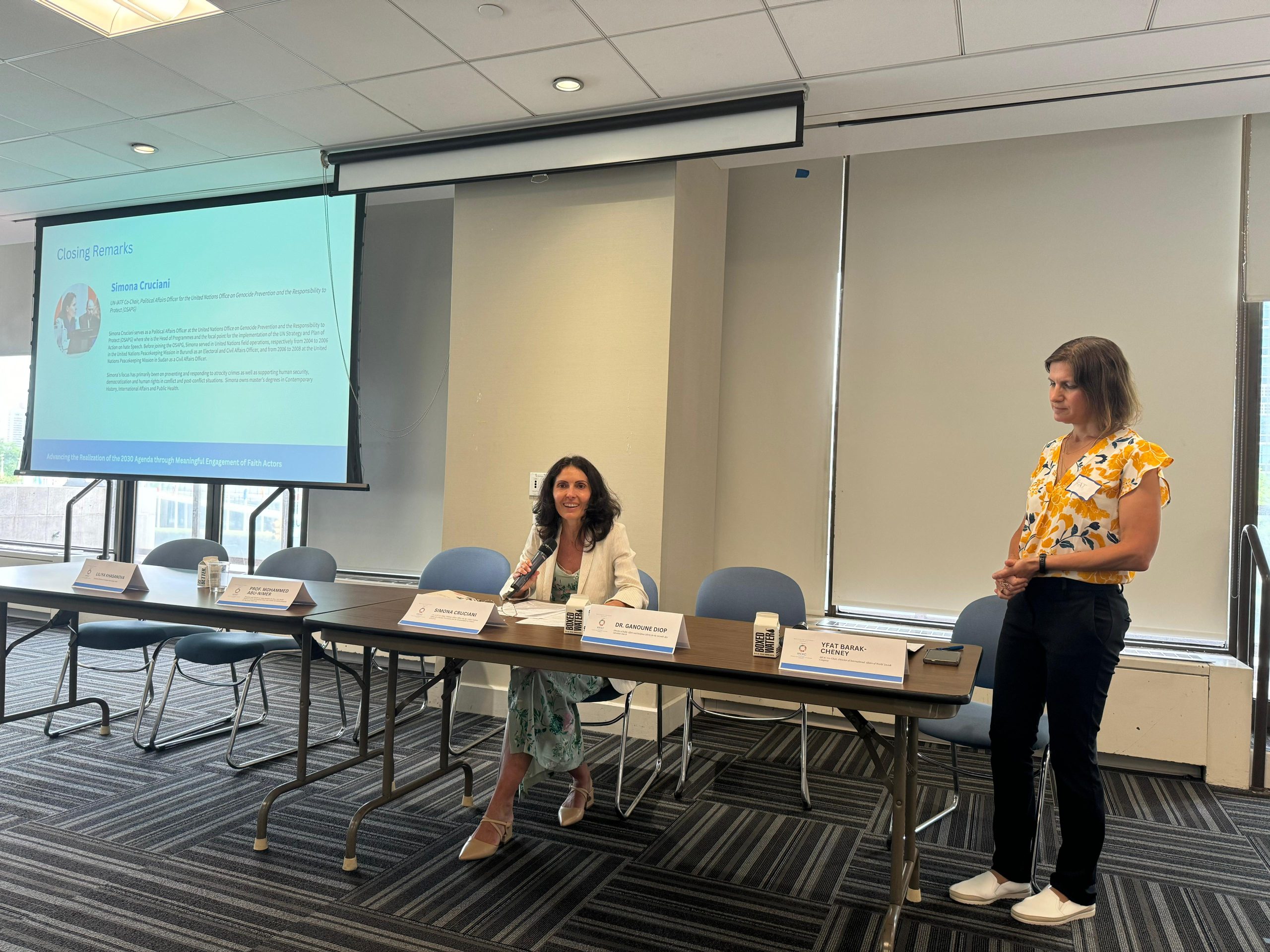Fifth Kofi Annan Faith Briefing Calls for ‘Unity, Urgency, and Courage’
Multi-Faith Advisory Council
Closing Photo for the MFAC Kofi Annan Faith Briefing. 2025.
On 15 July 2025, the Multi-Faith Advisory Council (MFAC) to the UN Inter-Agency Task Force on Religion and Sustainable Development (UN-IATF), convened the fifth Kofi Annan Faith Briefings in New York City. Aligned with the High-Level Political Forum (HLPF) the event was themed, “Advancing the Realization of the 2030 Agenda through Meaningful Engagement of Faith Actors”, highlighting faith actors’ critical contributions to accelerating the Sustainable Development Goals (SDGs) and progress toward the 2030 Agenda.
The Briefing showcased faith-based contributions across the SDGs, including peace and security, gender equality, youth engagement, climate action, and multilateral cooperation. This annual gathering brought together over 140 participants, 50 in person and 90 online, representing a diverse spectrum of faith-based organizations, UN agencies, humanitarian partners, advocacy coalitions, and academic institutions.
Opening Messages: Calls for Unity, Urgency, and Courage
MFAC Co-Chair, Ryan Koch, Director of the New York Office of Public and International Affairs for The Church of Jesus Christ of Latter-day Saints, opened the event on behalf of the MFAC, acknowledging the global efforts toward achieving the SDGs and the gaps that remain. Emphasizing the urgency of accelerating action, he underscored the role of the faith community’s unique position to drive progress. Faith-based actors have consistently proven essential in addressing social, economic, and environmental issues. Their contributions in positively supporting their communities not only inspired the creation of the UN Interagency Task Force on Religion and Development but also led to the formation of MFAC and the Kofi Annan Faith Briefings.
In a video message, H.E. Mr. Miguel Ángel Moratinos, United Nations Under-Secretary-General, High Representative for the United Nations Alliance of Civilizations, and United Nations Special Envoy to Combat Islamophobia, reaffirmed the critical role of faith-based organizations (FBOs) and religious leaders in supporting the United Nations’ work on peace, development, and interfaith understanding. He praised the consistent engagement of FBOs through partnerships with the UN-IATF and MFAC, recognizing their unwavering commitment across diverse traditions and geographies.
H.E. Mr. Miguel Ángel Moratinos delivering his video address. 2025.
“Over the years, the Kofi Annan Faith Briefings has offered an important platform to bring together the UN-IATF and MFAC, who are long-term partners of UN offices and entities.” –H.E. Mr. Miguel Ángel Moratinos, United Nations Under-Secretary-General, High Representative for the United Nations Alliance of Civilizations
Professor Azza Karam, President and CEO of Lead Integrity, further stressed that religious actors have historically been among the first human rights defenders. She noted that while faith-based partners are deeply embedded in UN development efforts at the country level, their contributions are often overlooked at UN headquarters. Karam highlighted that the MFAC and UN-IATF were established to foster coordination and collaboration, not competition, among diverse faith and interfaith groups. Underscoring the collective and inclusive approach from the Briefings, Karam states,
“The Multifaith Advisory Council is designed to be a space where faith traditions come together to model a new kind of multilateral cooperation.” –Professor Azza Karam, President and CEO of Lead Integrity
Prof. Azza Karam delivering opening remarks during the Briefing. 2025.
Insights and Reflections: Faith Leadership in Times of Crisis
Two panels convened esteemed members of MFAC, exploring the nexus of the role of faith communities and the SDGs. The first panel focused on how faith-based organizations are currently contributing to the SDGs through strategic and operational partnerships with UN agencies and governments. Participants reflected on alternative formal multilateralism approaches.
The second panel focused on future strategies for faith engagement in sustainable development. The panel explored critical dimensions of advancing the SDGs through faith-based partnerships within multilateral frameworks, youth empowerment, and fostering inclusive societies. The discussion emphasized how faith communities uniquely contribute to global cooperation, youth engagement, and social cohesion amid current geopolitical challenges.
Key Recommendations
1. Include faith-based organizations as formal stakeholders in governance, peace processes, and international decision-making. For example, create institutional “faith seats” in multilateral bodies and ensure shared power structures that reflect their long-term community presence.
2. Strengthen intergenerational and inclusive collaboration by supporting youth-led, women-led, and elder-led initiatives equally through funding, visibility, and mentoring. Establish intergenerational platforms where diverse faith actors can exchange knowledge, co-design solutions, and jointly advocate for justice.
3. Facilitate collaborative spaces that bring together religious actors, humanitarian agencies, peacebuilders, and policymakers. Encourage cross-sectoral learning and joint implementation to build more resilient and inclusive responses to global challenges.
4. Invest in strategic storytelling and impact measurement through documenting faith-based contributions using both qualitative storytelling and quantitative metrics aligned with UN frameworks. Showcase impact to donors, governments, and skeptical audiences through clear communication strategies that enhance credibility and influence.
5. Translate moral leadership into practical climate and justice action, for example by amplifying theological frameworks (e.g. Laudato Si’) that links spirituality with environmental and social justice.
6. Anchor all efforts, environmental, peacebuilding, and developmental, in a vision that centers the people and communities most affected. Reaffirm shared values of human dignity, solidarity, and moral courage in political and spiritual decision-making.
Closing Remarks: Upholding Partnerships Amidst Global Challenges
Simona Cruciani, UN-IATF Co-Chair and Head of Programmes at the UN Office on Genocide Prevention, delivered the closing remarks, emphasizing the vital partnership between the UN and faith-based organizations in addressing the interconnected challenges of underdevelopment, conflict, and sustainable development. She highlighted the Kofi Annan Faith Briefings as a crucial platform for bringing grassroots faith perspectives into UN dialogues. “We need more stories from faith-based organizations, told in a language the UN understands,” she noted.
Cruciani acknowledged the current global challenges, including attacks on multilateralism and human rights abuses, but underscored that enduring partnerships, not resources, are the foundation of collective progress.
UN-IATF Co-Chair Simona Cruciani delivering her closing remarks. 2025.
“They can take away our funding, but not our partnerships.”
–Simona Cruciani, UN-IATF Co-Chair and Head of Programmes at the UN Office on Genocide Prevention
MFAC Co-Chair Yfat Barak-Cheney, Director of International Affairs of World Jewish Congress, echoed this message, stressing that faith-based organizations play a critical role in advancing gender equality, peacebuilding, and climate action. Urging faith actors to move beyond sumbolic engagement and act with urgency and humility, Cheney emphasizes,
“It’s not just a moral voice; it’s a local presence…exactly what the SDGs need.” –Yfat Barak-Cheney, MFAC Co-Chair and Director of International Affairs of World Jewish Congress
About the UN Multi-Faith Advisory Council
In 2010, the United Nations created the Interagency Task Force on Religion and Sustainable Development, which today includes more than 20 UN agencies. Its purpose is to provide policy guidance around engagement with faith- based actors, deepen UN system staff’s understanding of the intersections of religion and the UN pillars of development, human rights and peace and security, as well as provide strategic policy guidance.
In September 2018, the UN IATF established the Multi-faith Advisory Council (MFAC), an informal and voluntary entity which consists of 36 religious leaders and heads of faith-based organizations. The composition reflects the diversity of religions, regional and national presence, and covers different thematic areas that mirror the UN’s mandate.
Follow the Peacemakers Network on social

